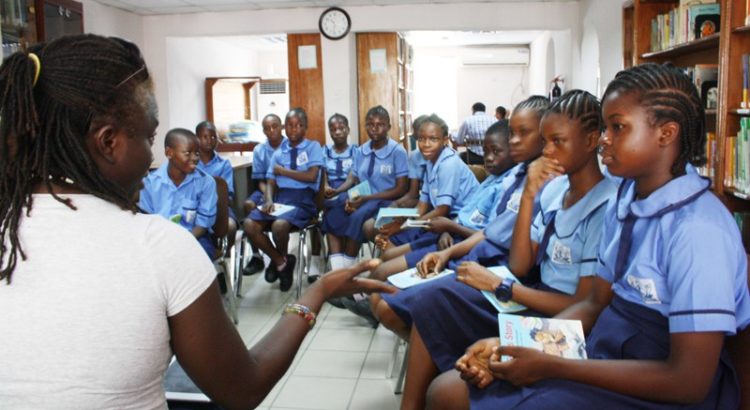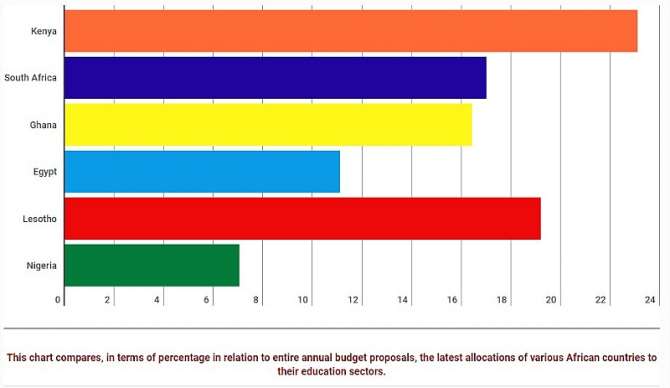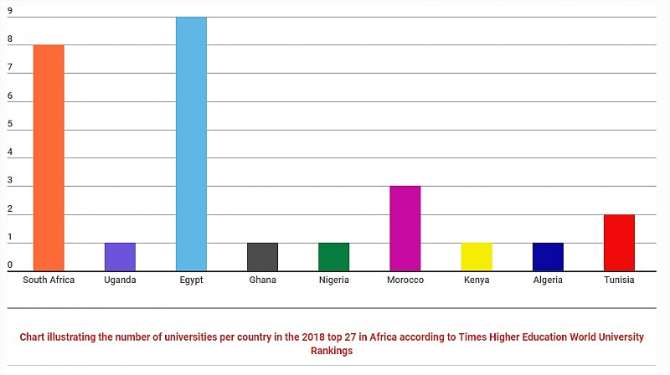By Adekunle Adebajo
For as far as most Nigerians can remember, this country has been proudlyreferred to astheGiant of Africa. This title was earned by virtue of her intimidating economy, her huge population and her big brother role during the years immediately following her independence from British rule. However, the country is fast losing the respect accorded to her in the past, not only in Africa but across the globe. The factors responsible for this are not far-fetched: poor supply of electricity, poor state of infrastructure, notoriousness for internet fraud, corruption, an inferior quality of education among others.
Homing in on the last, it has been discovered that the state of the country’s schools can be easily explained financially. Comparing the budgetary behaviour of Nigeria and some other countries across Africa reveals that Nigeria’s giant status is not found where it matters the most, particularly in the level of attention paid to the education sector. While other African countries seem to have recognised the potency of education as a midwife to development, a better economy, a safer society and a more prosperous population, Nigeria’s priorities are still found in sustaining an excessively expensive system of governance and in national security, the funds for which often reflect better in foreign bank accounts rather than local battlefields. Rather than set the pace in implementing global standards, Nigeria evidently has a lot to learn from smaller and younger countries across the continent.
Kenya
Kenya’s education sector has traditionally received the lion’s share of the country’s national budget to take care of teachers’ salaries, and primary and secondary school subsidies; and this tradition was upheld in the 2015 budget.In April 2016, the Kenyan government tabled its 2016/17 national budget estimates before the National Assembly. The Budget Policy Statement (BPS) ceilings in all the sectors summed up to 1,498 Kenyan shillings; but the Gross Expenditure Estimates, after the increase by the Treasury, amounted to 1.667 trillion Kenyan shillings. Based on the BPS, education received a total of 346.6 Ksh, which in other words is 23.1% of the entire budget. This figure is topped only by the allocation to Energy, Infrastructure and ICT, some of the projects under which are also academic in nature, for instance the laptop project gulping Ksh 17.58 billion.
South Africa
In the 2016/17 budgetary year in South Africa, the country spent R213.7 billion on basic education, which is about 15% of the total budget; and, according to the National Treasury, the allocation is projected to rise an average of 7.4% annually over the following three fiscal years. In terms of percentage, this allocation, according to data from the United Nations, trumps those of the United States, United Kingdom and Germany. As projected, more recent figures are even more education-friendly. According to aUnited Nations Children Fund (UNICEF) document titled, “Education Budget, South Africa, 2017/2018”, the budget for school children is presently 17% of total government expenditure.
Ghana
Ghana has also established herself as one of Africa’s big spenders on education. In 2013, she committed a whopping 31% of her budget to education as against Nigeria’s 8% in the same year. The following year, the figure dropped to 20.5%; and it declined even more in 2015 to 17.8% and in 2016 to 13.5%. In 2017, however, the Ministry of Education’s budget experienced a 20.7% increase from the previous year’s figure; that is from 7.55 billion Ghanaian cedes to 9.12 billion Ghanaian cedes. And in 2018, the allocation has increased by another 11.6% as the government proposed last year to spend GHS 10.18 billion on the Ministry. This amounts to 16.42% of the total budget of GHS 62 billion.
Egypt
As for Egypt, one country whose universities alwaysstand out on the continental ranking, the government proposed to spend EGP 104 billion on education in the 2016/2017 fiscal year, which amounted to 11.1% of government spending in that year. This is an improvement on the allocation of EGP 99.3 billion the previous year. The increment in the allocation is partly attributable to the Egyptian Constitution. According to the document, the government is required to spend at least 3 per cent of the Gross National Product (GNP) on healthcare and at least 4 per cent on education every year. It is noteworthy that the global average education budget in relation to GDP stands at 5%.
Lesotho
This country is renowned to spend most part of its GDP on education. According to the budget speech to the parliament for the 2017/2018 fiscal year presented by Dr.MoeketsiMajoro, the Minister of Finance, the government proposed to spend a total of M2.423 billion on education and training in 2018. This, to put it differently, is 19.2% of the entire budget. The previous year, the government had spent 20.7% on
the same sector.
Now to Nigeria
In the acclaimed giant of Africa and home to the largest black population on earth, regard for education appears to be an anathema to all forms of government, whether led by a military dictator or a democratically elected individual, a Northerner or a Southerner, a Major General or a Ph.D. holder. An assessment of the trend from 1999 shows that the lowest allocation, 4.46%, to education was in 1999, and the highest, 11.44%, was in 2015. The average allocation in all 16 years of democratic rule is 9.14%. In the pre-1999 years of military rule, the sector did not fare any better as a study has shown that the average allocation to education between the years of 1981 and 1998 was a meagre 4.18%.
The situation has in fact worsened under the present administration. The first budget presented by President MuhammaduBuhari in December 2015 for the 2016 fiscal year was in stark contrast to the double digits legacy left by his predecessor. Education received ₦369.6 billion, which was 6.07% of the entire budget. In the 2017 budget proposals, N448.01billion was allocated to education, representing about 6% of the ₦7.30 trillion budget. And in the 2018 Appropriation Bill, the government proposed an allocation of ₦435.01 billion to education, which is just 7.04% of the total budgeted amount of ₦8.612 trillion.
Nigeria against the world
Across Africa, most countries are spending more and more on education by the year. As a matter of fact, government expenditure on education in Sub-Saharan Africa increased from US$12 billion in 2000 to US$67 billion in 2013 representing over 450% growth. This trend has resulted in higher literacy rates, lesser numbers of out-of-school children, improved quality of learning, and more foreign investments as well as greater industrialisation owing to greater availability of skilled labour. It has also led to a gradual increase in GDP for many of these countries as educated citizens naturally earn more than those who do benefit from formal learning.
Nigeria, on the other hand, especially under the presidency of MuhammaduBuhari, has yet to board the train of progress, despite cries from various corners. For this country, it has become an unending cycle of budgetary disregard for education, and complaints from stakeholders, accompaniedby silence from the government. The same pattern is repeated year in year out. This habit has affected us greatly, because not only are our schools not reckoned with on the international stage, the culture of academic tourism has seen our economy shed weight to the benefit of such countries as the United States, the United Kingdom and even Ghana.
In 2012, the Chairman of Exam Ethics International, Ike Onyechere, said Nigerians spend over ₦1.5 trillion annually on students studying abroad. ₦160 billion out of this goes to Ghana, while ₦80 billion goes to the United Kingdom. Likewise, in 2016, the Chairman of the Senate Committee on Tertiary Institution and Tertiary Education Trust Fund, Senator BintaMasi, said Nigeria spends over $2 billion annually as capital flight on education abroad. With this figure alone, Nigeria can build one or two world-class universities every year, considering the fact that Pakistan planned to spend $750 million for each of its new universities of engineering, science and technology and Qatar’s Cornell University spent the same amount establishing its School of Medicine in 2002.
The country’s lacklustre attitude towards education equally reflects in the ranking of universities across the globe and in Africa. According to the 2016 Times Higher Education World University Rankings, there is only one Nigerian university in the top 15 ranking in Africa, and that university, the University of Ibadan, is number 14 on the list. On the same list, we have six universities from South Africa, three from Egypt, two from Morocco, one from Uganda (ranked fourth), one from the Ghana (ranked seventh), and one from Kenya (ranked eighth). A similar pattern recurred in the 2018 ranking.
Finally
It is high time the Nigerian government recognised that recognising the good in education is for the good of the country. We do not have to go as far as the extreme West or the far East to get examples of countries reaping bountifully from great investments in education. Right here in Africa, there are more than sufficient instances. The Nigerian National Assembly should adopt the Egyptian legislative model by incorporating, into the constitution, a benchmark for budgetary allocations to the education sector. This preferably must not fall below 5% of the nation’s GDP or 20% of government’s annual spending.
Our schools are ailing; and it is not by scrapping Post UTME or quelling industrial actions that they will get better. We must make conscious, radical efforts by investing all we can to turn things around for good. Before we complain that our graduates are unemployable, we must ask first if our schools are habitable and if our facilities are universally acceptable. But beyond just dumping huge sums of money into the sector in theory, the government has to also ensure a balance in recurrent and capital expenditures as well as an effective implementation of whatever plans are laid out on paper. If we can do this, then the return of the giant to her rightful place is not only inevitable but will happen before long, before our very eyes.
Source:
https://www.thenigerianvoice.com/news/263557/of-investment-in-education-is-nigeria-still-africas-giant.html







 Users Today : 22
Users Today : 22 Total Users : 35453438
Total Users : 35453438 Views Today : 27
Views Today : 27 Total views : 3399688
Total views : 3399688